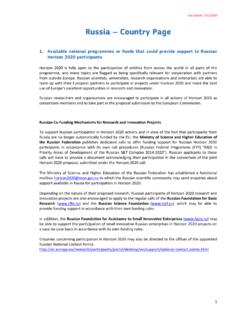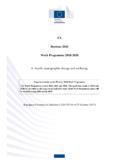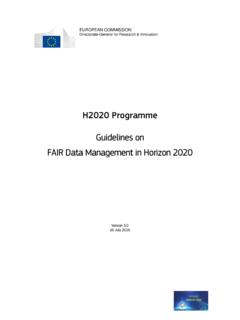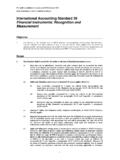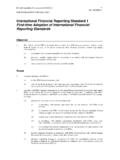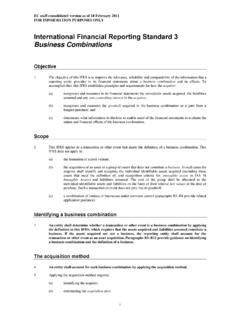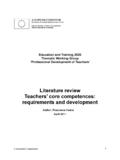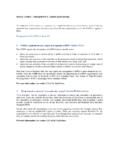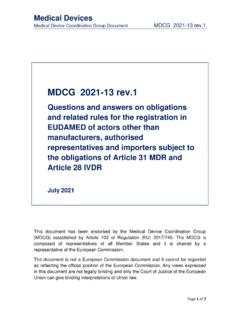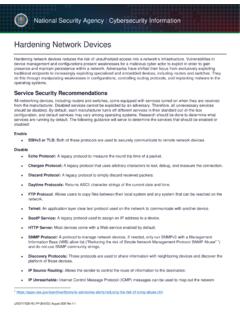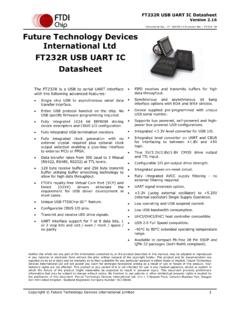Transcription of Management of Legacy Devices - European Commission
1 Management of Legacy Devices MDR EUDAMED Date: Doc. Version: TABLE OF CONTENTS 1 INTRODUCTION .. 1 2 GENERAL CONSIDERATIONS .. 1 3 IDENTIFICATION DETAILS FOR Legacy Devices .. 1 4 LINKING THE REGULATION Devices TO Legacy Devices .. 4 ANNEX 1: FORMAT OF THE EUDAMED DI IDENTIFICATION NUMBER (WHEN IT IS NOT GENERATED FROM UDI-DI) .. 6 FORMAT OF THE EUDAMED DI CODE .. 6 CALCULATION STEPS .. 7 REFERENCE TABLE 1 REFERENCE VALUES FOR THE CHARACTERS USED IN THE CODE .. 8 REFERENCE TABLE 2 REFERENCE VALUE FOR CHECK-DIGIT CALCULATIONS .. 9 CALCULATION EXAMPLES .. 10 TABLE OF FIGURES FIGURE 1 Management OF UNIQUE DEVICE IDENTIFICATION ELEMENTS FOR Legacy Devices .. 2 FIGURE 2 - REGISTRATION OF A REGULATION 4 FIGURE 3 - MANUAL LINKING OF A Legacy DEVICE TO A REGULATION DEVICE .. 5 Management of Legacy Devices MDR EUDAMED 1 European Commission DG SANTE 1 INTRODUCTION This document contains the details of how Legacy Devices will be identified in EUDAMED and the way the different Unique Device Identifiers for the Legacy Devices will be generated/assigned.
2 2 GENERAL CONSIDERATIONS Legacy Devices are defined as Medical Devices , Active Implantable Medical Devices and In Vitro Diagnostic Medical Devices that are covered by a valid certificate issued in accordance with Directive 93/42/EEC, Directive 90/385/EEC or Directive 98/79/EC and that continue to be placed on the market after the date of application of Regulation (EU) 2017/745 (MDR) or Regulation 2017/746 (IVDR). Guidance on registration of Legacy Devices in EUDAMED is provided in the "MDCG 2019-5 Registration of Legacy Devices in EUDAMED April 2019" document ( ). Manufacturers will have the possibility to register any of their Legacy Devices in EUDAMED. As explained in the guidance document, their registration will be mandatory in case a serious incident occurs or there is a field safety corrective action to apply, which requires registration as soon as possible and at least before a follow up or final vigilance report is submitted.
3 Furthermore, if 18 months after the date of application of the MDR or IVDR (or 24 months after the date of publication of the notice referred to in Article 34(3) if EUDAMED is not fully functional before the date of application of the MDR), the equivalent device is not made compliant and registered as a MDR or IVDR device, the Legacy Device must be registered in EUDAMED within this time period. Legacy Devices with the risk class I that are not sterile and/or with a measuring function under the Directives cannot be considered as Legacy Devices because they do not require a certificate issued by a Notified Body. These must be registered only as Regulation Devices in EUDAMED within the 18 months after the date of application (or 24 months after the date of publication of the notice referred to in Article 34(3) if EUDAMED is not fully functional before the date of application of the MDR).
4 3 IDENTIFICATION DETAILS FOR Legacy Devices Legacy Devices are subject to the MDR or IVDR registration requirements with some exceptions such as the assignment of a Basic UDI-DI and a UDI-DI. Even if the assignment of a Basic UDI-DI and UDI-DI is not required for a Legacy Device, in order to keep the same standard structure and identification elements for all Devices registered in EUDAMED, an identification element EUDAMED DI (the equivalent of the Basic UDI-DI) will be required, and a EUDAMED ID (in case no UDI-DI has been assigned) will be generated from the EUDAMED DI. Therefore, a Basic UDI-DI will never be applicable and never be assigned to a Legacy Device, only EUDAMED DI. On the other hand, a UDI-DI can be used to identify a Legacy Device in EUDAMED. Moreover, only one device identifier will be assigned to a Legacy Device, either a UDI-DI (where the EUDAMED DI is automatically generated) or a EUDAMED DI (where the EUDAMED ID is automatically generated).
5 Management of Legacy Devices MDR EUDAMED 2 European Commission DG SANTE Figure 1 Management of unique device identification elements for Legacy Devices Management of Legacy Devices MDR EUDAMED 3 European Commission DG SANTE Case 1: Generation of identification details for a Legacy Device when a UDI-DI already exists In case the manufacturer has already a UDI-DI assigned to a Legacy Device, they will be able to use it as a device identifier for the Legacy Device. In this case, the EUDAMED DI is automatically generated from the UDI-DI value. The Legacy Device will therefore have the following identification elements: a EUDAMED DI (generated based on the UDI-DI) and a UDI-DI (assigned by the manufacturer).
6 In order to generate the EUDAMED DI identification element from the UDI-DI provided, EUDAMED will use a standard format, placing the characters "B-" in front of the UDI-DI provided Example: Provided UDI-DI: M991 CVS12130 NES2 Generated EUDAMED DI: B-M991 CVS12130 NES2 Case 2: Generation of identification details for a Legacy Device when a UDI-DI does not exist In case the manufacturer does not have a UDI-DI assigned for a Legacy Device, the manufacturer will have to assign a EUDAMED DI and EUDAMED ID. The EUDAMED DI will have a strict format, starting with 'B-' as a prefix and continuing with a set of characters as defined in Annex 1. The EUDAMED ID will have the same format and value as EUDAMED DI except the first prefix character. It will start with 'D' instead of 'B'. Example: EUDAMED DI: B-BEMF000000106CR023335WE EUDAMED ID: D-BEMF000000106CR023335WE Management of Legacy Devices MDR EUDAMED 4 European Commission DG SANTE 4 LINKING THE REGULATION Devices TO Legacy Devices When the equivalent of a Legacy Device becomes a compliant Regulation Device (having fulfilled all MDR or IVDR requirements to be covered by the required MDR or IVDR certificate(s)), a new Regulation Device shall be registered in EUDAMED in accordance with the MDR/IVDR requirements.
7 EUDAMED will allow linking of the Regulation Device with the Legacy Device and perform this linking automatically where the same UDI-DI has been assigned to both the Legacy Device and the Regulation Device. The link will be made at the level of the UDI-DI. If the Regulation Device is exactly the same as the Legacy Device (except that it is MDR or IVDR compliant), the Regulation Device may have the same UDI-DI as the Legacy Device. In this case, the link between the two Devices will be made automatically; otherwise, the manufacturer can create the link manually by providing the Legacy Device identifier. Figure 2 - Registration of a Regulation Device Management of Legacy Devices MDR EUDAMED 5 European Commission DG SANTE Figure 3 - Manual Linking of a Legacy Device to a Regulation Device Management of Legacy Devices MDR EUDAMED 6 European Commission DG SANTE ANNEX 1: FORMAT OF THE EUDAMED DI IDENTIFICATION NUMBER (WHEN IT IS NOT GENERATED FROM UDI-DI) In order to keep a consistency in the formatting structure of the EUDAMED DI and the Basic UDI-DI structures used by Issuing Entities, EUDAMED proposes a structure similar to the Global Model Number (GMN).
8 Key characteristics of the format structure: 25 characters maximum length of the identifier (including the prefix and check digits); allows the use of characters inside the code - permits the use of a subset of characters already implemented in other formatting structures by other entities; implements a two key check-digit; Prefix (B-) implemented in order to create a easily recognisable format for EUDAMED DI Note: Because the format for generating EUDAMED DI codes does not necessarily include the unique identification number of the manufacturer provided by EUDAMED ( the manufacturer s SRN), there is a risk that the same code is assigned by two different manufacturers for different Devices . As best practice, the unique identifier assigned by the manufacturer should include its SRN (described below under Format for EUDAMED DI code ) for the generation of EUDAMED DI. In order to prevent registration of duplicates, EUDAMED DI together with the Issuing Entity (EUDAMED DI and EUDAMED ID will have by default the issuing entity "EUDAMED") are checked for uniqueness.
9 In the case where a manufacturer has already registered a Legacy Device with a EUDAMED DI code, any other Legacy Device to which the same EUDAMED DI code would have been assigned will be refused for registration. Format of the EUDAMED DI code PrefixManufacturer`s unique referenceCheck CharactersB (n<=21)Cn+1 Cn+2B-' - Prefix defined for EUDAMED DI (required by default) - not taken into account into the Check-digit calculationC1-Cn - Unique identifier assigned by the Manufacturer for the Device. Cannot go above 21. Optionally can include in the beginning the SRN of the Manufacturer (without the '-' characters) : ;Cn+1 and Cn+2 - Check Digit characters;C - characters used in the Code generationEUDAMED DI FormatManagement of Legacy Devices MDR EUDAMED 7 European Commission DG SANTE Calculation Steps Step 1: Assigning a reference value For each character inside the Code, except the first 2 characters composing the prefix ('B-'), identify the assigned value in Table 1 Reference value; Step 2: Assigning a prime number weight for each element Assign a prime number weight starting with the right most non-check digit character and continuing until the first character in the Code.
10 Note: The first 21 prime numbers: 2, 3, 5, 7, 11, 13, 17, 19, 23, 29, 31, 37, 41, 43, 47, 53, 59, 61, 67, 71, 73 Step 3: Determine the total value Multiply the Reference value assigned in Step 1 and the weight assigned in Step 2 for each character and calculate the total of the values obtained; Step 4: Apply Modulo 1021 to the total value obtained Perform MOD (1021) operation on the sum obtained in Step 4. The value obtained will be used for further calculations of the Check-digit number Ck. Ck= Mod (1021) Total Value (value of Step 3); Step 5: Determine the value of the first Check-digit The Assigned value for the first Check-Digit is obtained by obtaining the integer value of the Check-digit number (value Step 4) split by 32: Assigned value= Int(Ck / 32); The Assigned value obtained will be used in Table 2 in order to obtain the corresponding Character set for Check-Digit C(n+1); Step 6: Determine the value of the second Check-digit The Assigned value for the second Check-Digit is obtained by applying Modulo 32 to the Check-digit number (value Step 4): Assigned value = Mod(32)Ck; The Assigned value obtained will be used in Table 2 in order to obtain the corresponding Character set for Check-Digit C(n+2).
